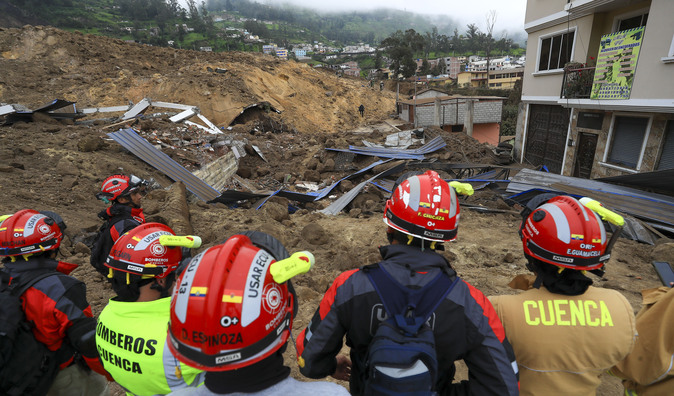- Diplomacy Fernández and Lasso mistreat each other by letter and take the relationship of Argentina and Ecuador to the limit
The town of Alausí, in the Andes of Ecuador, woke up on Monday partially buried by a gigantic avalanche after breaking off part of the mountain and devastating, for the moment, with seven lives and dozens of houses and people who are still under tons of earth.
In addition to the seven deaths already confirmed, the missing amount to 64, according to the latest report of the National Secretariat of Risks, which initially erroneously reported sixteen fatalities.
So far, 32 people have been rescued alive and there are 23 injured, in addition to 22 victims, corresponding to five families who have been transferred to temporary shelters installed in this municipality of the Andean province of Chimborazo.
In the area there have also been half a thousand people affected, corresponding to 163 homes.
The landslide happened around 22:00 local time on Sunday (3:00 GMT on Monday), when most people were already sheltered in their homes, but its magnitude could only be appreciated once dawn and allowed to observe the razed area, which covers 24.3 hectares.
With the first rays of sun it was verified how the slope of the mountain fell on the sector of the population called Casual until reaching the lower part of the Municipal Stadium of Alausí, whose structure has been completely collapsed.
A VERY LONG NIGHT
The scene that revealed the dawn confirmed the worst forecasts of a very long night in this Andean town, where the firefighters of Alausí and groups of volunteers had tried to make the first rescues with shovels.
"Alausí has lost too much with so many dead families, entire families," Susana Llamuca, president of the affected neighborhoods, told EFE, who has little hope that the disappeared can be found alive.
Damage caused by the avalanche. Dolores OchoaAFP
Meanwhile, another neighbor who was walking to try to find the location of the houses of her acquaintances and relatives, told EFE that "there must be many people underneath."
PRESIDENT ARRIVES IN THE AREA
Late in the day, Ecuadorian President Guillermo Lasso arrived in the area, asking to hope that some people were still alive.
Otherwise, the president guaranteed to do everything possible to recover the bodies and deliver them to their families.
In an impromptu statement near "ground zero," neighbors asked the head of state to expedite state aid and the arrival of heavy machinery, but he pointed out that it may be counterproductive to enter with these vehicles in a still unstable terrain.
The president of Ecuador, Guillermo Lasso, in the affected area. DOLORES OCHOAafp
NATIONAL RESPONSE
Firefighters from eight cities in the country and search and rescue teams (USAR) from Quito and Cuenca have come to the emergency, which together with neighbors and personnel from other state institutions try to remove debris and find signs of life.
That is why, sometimes, rescuers ask for absolute silence to try to hear any sign of possible survivors.
There was also Jacob, a dog who was moved by his desperation when trying to dig in the immense avalanche with the instinct of finding his family buried by the slide. He sniffed and dug and sobbed and waited for someone to return his own.
Several people watch the avalanche from afar. DOLORES OCHOAAFP
A TRAGEDY WARNED
The indications that the huge landslide was going to happen had been occurring since the first days of December 2022, when the E35 road began to sink and cracks appeared that with the passage of days became more than one meter wide.
The National Secretariat of Risks said in its report that on March 11 it sent the governor (Government delegate) of Chimborazo and the mayor of Alausí a technical report that recommended and requested the evacuation of the population, among other measures.
Even on the day of the tragedy, local authorities had made a tour in the morning to inspect the state of the cracks and alert the residents of the area of the situation of potential danger to their lives.
According to The Trust Project criteria
Learn more
- Ecuador

